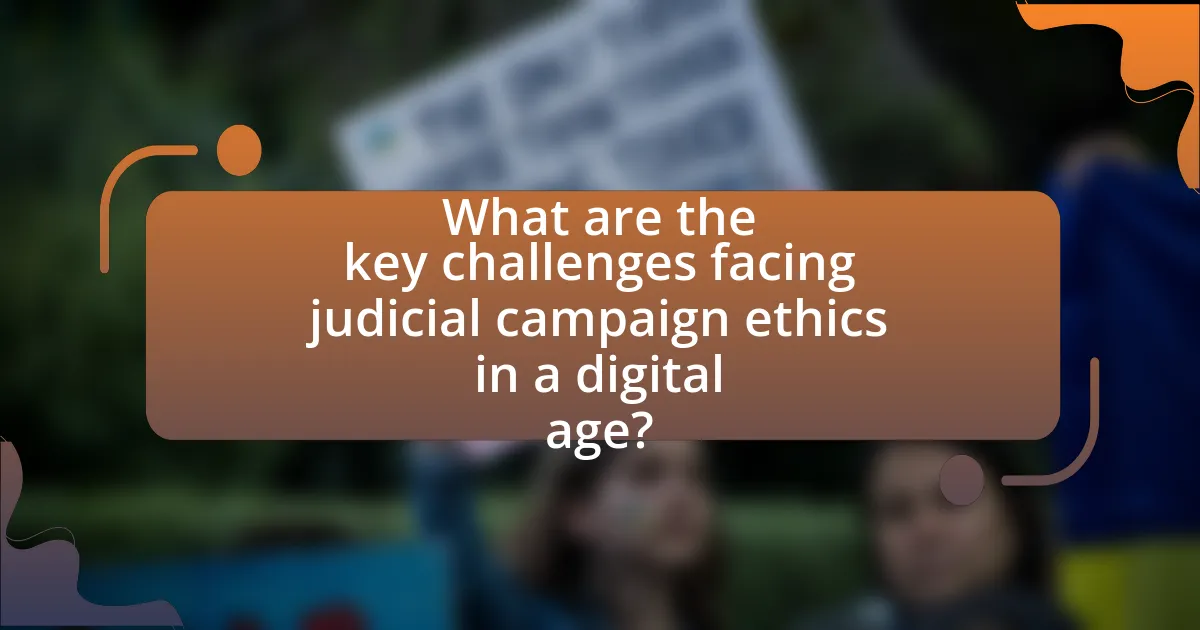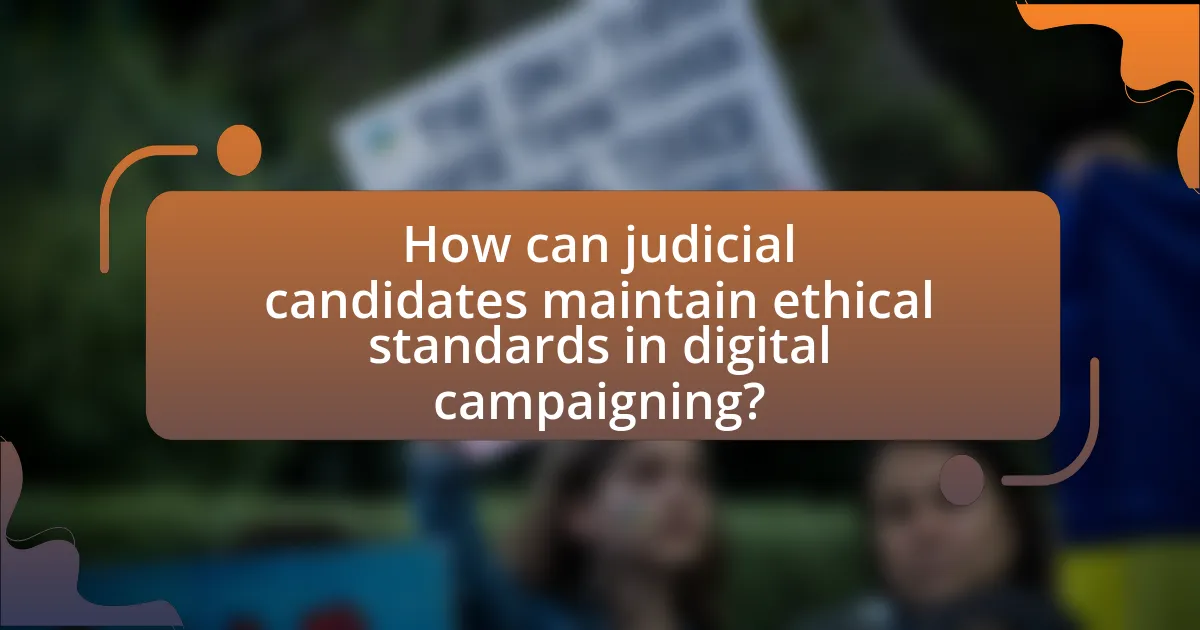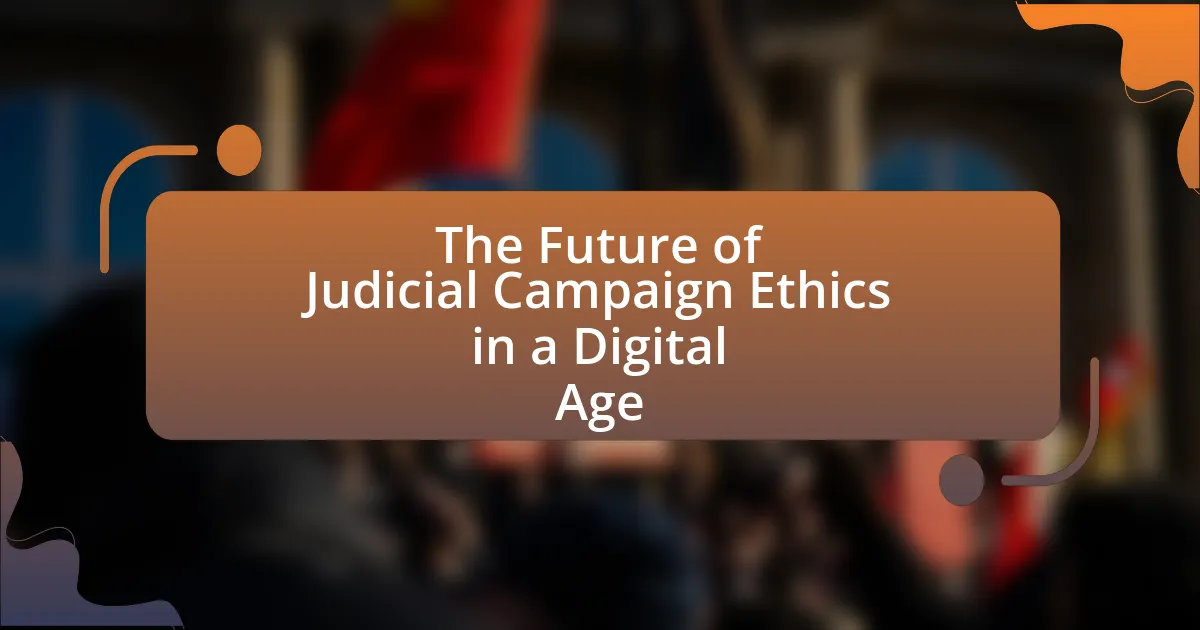The article examines the evolving landscape of judicial campaign ethics in the digital age, highlighting key challenges such as misinformation, social media influence, and the complexities of online fundraising. It discusses how digital platforms have transformed campaign strategies, enhancing candidate visibility while raising ethical dilemmas regarding bias and impartiality. The piece emphasizes the need for clear ethical guidelines and proactive measures to combat misinformation, ensure transparency, and maintain public trust in the judiciary. Additionally, it explores the role of technology and educational initiatives in promoting ethical standards within judicial campaigns.

What are the key challenges facing judicial campaign ethics in a digital age?
Key challenges facing judicial campaign ethics in a digital age include the proliferation of misinformation, the impact of social media on public perception, and the difficulty in regulating online campaign contributions. Misinformation can undermine the integrity of judicial candidates by spreading false narratives, which can influence voter opinions and decisions. Social media platforms amplify these narratives, making it challenging for candidates to maintain ethical standards and for voters to discern factual information. Additionally, the lack of transparency in online contributions complicates the enforcement of existing ethical guidelines, as traditional oversight mechanisms struggle to adapt to the rapid evolution of digital fundraising practices. These challenges necessitate a reevaluation of ethical standards to ensure the integrity of judicial campaigns in the digital landscape.
How has the rise of digital platforms impacted judicial campaigns?
The rise of digital platforms has significantly transformed judicial campaigns by enhancing candidate visibility and voter engagement. Digital platforms allow judicial candidates to reach a broader audience through targeted advertising and social media outreach, which has been shown to increase voter awareness and participation. For instance, a study by the Brennan Center for Justice found that candidates who utilized social media effectively could engage with voters more directly, leading to higher turnout rates in judicial elections. Additionally, the ability to disseminate information quickly and interactively has shifted the dynamics of campaign strategies, making them more responsive to public sentiment and issues.
What specific ethical dilemmas arise from social media use in judicial campaigns?
Social media use in judicial campaigns raises specific ethical dilemmas, including the potential for bias, misinformation, and the erosion of judicial impartiality. The presence of targeted advertisements can lead to the manipulation of public perception, as candidates may selectively present information to sway voters. Additionally, the rapid spread of misinformation on social media platforms can undermine the integrity of the electoral process, as false narratives may influence voter decisions. Furthermore, the informal nature of social media interactions can blur the lines between professional conduct and personal opinions, challenging the expectation of impartiality that judges must uphold. These dilemmas highlight the need for clear ethical guidelines governing the use of social media in judicial campaigns to maintain public trust in the judicial system.
How do digital fundraising practices affect judicial campaign integrity?
Digital fundraising practices can compromise judicial campaign integrity by increasing the potential for conflicts of interest and undermining public trust. The reliance on online platforms for fundraising allows for anonymous donations, which can obscure the identities of contributors and their potential influence on judicial decisions. Research indicates that judges who receive significant campaign contributions may face pressure to rule favorably for their donors, leading to biased outcomes. For instance, a study by the Brennan Center for Justice found that in states with high campaign contributions, judges were more likely to favor corporate interests in their rulings. This dynamic raises concerns about the impartiality of the judiciary and the perception of fairness in legal proceedings.
What role does misinformation play in judicial campaigns today?
Misinformation significantly undermines judicial campaigns today by distorting public perception and influencing voter behavior. Judicial candidates often face false narratives that can misrepresent their qualifications, past rulings, or ethical standards, leading to a misinformed electorate. For instance, a study by the Brennan Center for Justice found that misinformation in political advertising can sway up to 20% of voters, highlighting its potential impact on election outcomes. This manipulation of information not only affects individual candidates but also erodes trust in the judicial system as a whole, complicating the ethical landscape of judicial campaigns in the digital age.
How can judicial candidates combat misinformation effectively?
Judicial candidates can combat misinformation effectively by proactively engaging with voters through transparent communication and utilizing fact-checking resources. By establishing a strong online presence, candidates can directly address false claims and provide accurate information about their qualifications and positions. Research indicates that candidates who actively counter misinformation can significantly reduce its impact; for instance, a study by the Pew Research Center found that 64% of voters are more likely to trust candidates who openly correct misinformation. Additionally, collaborating with reputable organizations that specialize in fact-checking can enhance credibility and provide voters with reliable information.
What are the consequences of misinformation on public perception of the judiciary?
Misinformation significantly undermines public perception of the judiciary by eroding trust and fostering skepticism about its impartiality. When false narratives circulate, they can lead to a distorted understanding of judicial processes and decisions, which may result in public outrage or apathy towards the legal system. For instance, a study by the Pew Research Center found that 70% of Americans believe misinformation about the judiciary affects their views on court decisions, indicating a direct correlation between misinformation and public sentiment. This erosion of trust can ultimately hinder the judiciary’s ability to function effectively, as public confidence is essential for the enforcement of laws and adherence to judicial rulings.

How can judicial candidates maintain ethical standards in digital campaigning?
Judicial candidates can maintain ethical standards in digital campaigning by adhering to established codes of conduct and ensuring transparency in their online communications. These candidates should avoid misleading information and ensure that all campaign materials are factually accurate, as the American Bar Association’s Model Code of Judicial Conduct emphasizes the importance of integrity and public confidence in the judiciary. Furthermore, candidates should engage in respectful discourse and refrain from personal attacks, aligning with ethical guidelines that promote civility and professionalism. By implementing these practices, judicial candidates can uphold the ethical standards necessary for maintaining public trust in the judicial system.
What guidelines exist for ethical digital campaigning in the judiciary?
Ethical digital campaigning in the judiciary is governed by guidelines that emphasize integrity, transparency, and respect for the judicial process. These guidelines typically include prohibitions against misleading information, the requirement for candidates to disclose their campaign funding sources, and the necessity to avoid any appearance of impropriety or bias. For instance, the American Bar Association’s Model Code of Judicial Conduct outlines that judges and candidates must maintain the independence of the judiciary and refrain from engaging in conduct that undermines public confidence in the judicial system. Additionally, many jurisdictions have specific rules regarding the use of social media and digital platforms to ensure that campaigns do not compromise the impartiality of the judiciary.
How can candidates ensure transparency in their online communications?
Candidates can ensure transparency in their online communications by clearly disclosing their affiliations, funding sources, and the intent behind their messages. This practice builds trust with the audience and aligns with ethical standards in judicial campaigns. For instance, the American Bar Association emphasizes the importance of honesty and clarity in communications to maintain public confidence in the judiciary. By providing this information, candidates can demonstrate accountability and foster an environment of openness, which is essential in the digital age where misinformation can easily spread.
What best practices should candidates follow to avoid conflicts of interest?
Candidates should disclose any personal, financial, or professional relationships that could influence their impartiality to avoid conflicts of interest. Transparency is essential in maintaining public trust and integrity in judicial campaigns. For instance, candidates should provide detailed financial disclosures and recuse themselves from decisions that may benefit their interests or those of close associates. Research indicates that transparency in campaign financing and relationships significantly enhances voter confidence and reduces perceived bias, as seen in studies conducted by the Brennan Center for Justice.
How can technology be leveraged to enhance ethical campaigning?
Technology can be leveraged to enhance ethical campaigning by utilizing data analytics and social media platforms to promote transparency and accountability. Data analytics allows campaigns to track voter sentiment and engagement, ensuring that messaging aligns with ethical standards and community values. For instance, platforms like Facebook and Twitter can be used to disseminate accurate information about candidates and their policies, reducing the spread of misinformation. Additionally, tools such as blockchain can provide verifiable records of campaign contributions, ensuring compliance with financial regulations and fostering trust among voters. These technological advancements support ethical practices by enabling campaigns to operate with greater integrity and responsiveness to public concerns.
What tools are available to promote ethical standards in digital campaigns?
Tools available to promote ethical standards in digital campaigns include regulatory frameworks, ethical guidelines, and technology solutions. Regulatory frameworks, such as the Federal Election Commission (FEC) guidelines, establish legal standards for campaign conduct. Ethical guidelines from organizations like the American Bar Association provide best practices for judicial candidates. Additionally, technology solutions, such as transparency tools that track campaign financing and social media monitoring software, help ensure compliance with ethical standards by promoting accountability and transparency in digital campaigning. These tools collectively support the integrity of judicial campaigns in the digital age.
How can data analytics be used responsibly in judicial campaigns?
Data analytics can be used responsibly in judicial campaigns by ensuring transparency, protecting voter privacy, and adhering to ethical guidelines. Responsible use involves collecting data in compliance with legal standards, such as the General Data Protection Regulation (GDPR), which mandates informed consent for data collection. Additionally, campaigns can utilize analytics to identify and engage with voters based on demographic insights while avoiding manipulation or targeting that could mislead or exploit vulnerable populations. For instance, a study by the Pew Research Center indicates that 79% of Americans are concerned about how their data is used, highlighting the importance of ethical data practices in maintaining public trust.

What future trends might shape judicial campaign ethics in a digital landscape?
Future trends that might shape judicial campaign ethics in a digital landscape include increased scrutiny of online campaign financing, the rise of social media influence, and the implementation of stricter regulations on digital advertising. Increased scrutiny of online campaign financing is driven by the growing concern over transparency and accountability in judicial elections, as evidenced by the 2010 Citizens United v. FEC ruling, which allowed for unlimited corporate spending in elections. The rise of social media influence is significant, as platforms like Facebook and Twitter have become primary channels for campaign messaging, necessitating ethical guidelines to prevent misinformation and ensure fairness. Additionally, the implementation of stricter regulations on digital advertising is likely, as states and organizations recognize the need to adapt existing campaign finance laws to address the unique challenges posed by digital platforms, ensuring that judicial candidates adhere to ethical standards in their online presence.
How will evolving technology influence judicial campaign strategies?
Evolving technology will significantly influence judicial campaign strategies by enabling more targeted outreach and data-driven decision-making. Campaigns will increasingly utilize social media platforms, data analytics, and artificial intelligence to identify and engage specific voter demographics, enhancing voter mobilization efforts. For instance, a study by the Pew Research Center found that 69% of adults in the U.S. use social media, which judicial campaigns can leverage to disseminate information and engage with constituents directly. Additionally, advancements in data analytics allow campaigns to analyze voter behavior and preferences, leading to more effective messaging and resource allocation. This shift towards technology-driven strategies will likely reshape the landscape of judicial campaigns, emphasizing the importance of digital presence and data utilization in reaching potential voters.
What emerging platforms could impact judicial campaigning in the future?
Emerging platforms that could impact judicial campaigning in the future include social media networks, blockchain technology, and artificial intelligence-driven analytics. Social media networks, such as TikTok and Instagram, allow for targeted outreach and engagement with younger voters, potentially reshaping campaign strategies. Blockchain technology can enhance transparency in campaign financing, ensuring that contributions are traceable and reducing the risk of corruption. Additionally, artificial intelligence-driven analytics can provide insights into voter behavior and preferences, enabling campaigns to tailor their messages more effectively. These platforms are increasingly being integrated into political strategies, as evidenced by the significant rise in social media ad spending during recent elections, which reached over $1 billion in the 2020 U.S. elections alone.
How might artificial intelligence change the landscape of judicial campaigns?
Artificial intelligence may significantly transform judicial campaigns by enhancing data analysis and targeting strategies. AI can process vast amounts of data to identify voter preferences and behaviors, allowing campaigns to tailor their messages more effectively. For instance, AI algorithms can analyze social media interactions and demographic information to create personalized outreach strategies, increasing voter engagement. Additionally, AI tools can monitor public sentiment in real-time, enabling campaigns to adjust their tactics swiftly based on emerging trends. This shift towards data-driven decision-making in judicial campaigns could lead to more strategic and efficient use of resources, ultimately influencing election outcomes.
What proactive measures can be taken to ensure ethical compliance in future campaigns?
To ensure ethical compliance in future campaigns, organizations should implement comprehensive training programs for all campaign staff on ethical standards and legal requirements. These training programs should cover topics such as transparency, conflict of interest, and the responsible use of digital platforms. Research indicates that organizations with structured ethics training experience a 30% reduction in compliance violations (Ethics & Compliance Initiative, 2020). Additionally, establishing a dedicated ethics oversight committee can provide ongoing guidance and accountability, ensuring that ethical considerations are integrated into all campaign strategies. Regular audits and assessments of campaign practices can further reinforce adherence to ethical standards, as evidenced by studies showing that proactive monitoring leads to improved compliance outcomes.
How can judicial organizations adapt to the changing digital environment?
Judicial organizations can adapt to the changing digital environment by implementing advanced technology for case management, enhancing online access to legal resources, and adopting digital communication strategies. For instance, many courts have begun using electronic filing systems, which streamline the submission of documents and improve efficiency. Additionally, the National Center for State Courts reported that over 80% of courts in the U.S. have adopted some form of online services, allowing greater public access to court information and resources. Furthermore, judicial organizations can utilize social media and digital platforms to engage with the public, ensuring transparency and fostering trust in the judicial process. These adaptations not only improve operational efficiency but also align with the evolving expectations of a digitally savvy society.
What role do educational initiatives play in promoting ethical digital campaigning?
Educational initiatives play a crucial role in promoting ethical digital campaigning by equipping individuals with the knowledge and skills necessary to navigate the complexities of online political communication responsibly. These initiatives provide training on ethical standards, legal regulations, and best practices, which help campaigners understand the implications of their digital strategies. For instance, programs that focus on misinformation and data privacy educate campaigners on the importance of transparency and accountability, thereby fostering a culture of ethical behavior in digital campaigning. Research indicates that campaigns that prioritize ethical training are more likely to engage in practices that uphold democratic values and public trust, as evidenced by studies showing a correlation between ethical training and reduced instances of deceptive practices in political advertising.
What practical steps can candidates take to uphold ethics in their digital campaigns?
Candidates can uphold ethics in their digital campaigns by ensuring transparency in their messaging and data usage. This involves clearly disclosing the sources of their information, the funding behind their campaigns, and how they collect and utilize voter data. For instance, adhering to the Federal Election Commission guidelines on campaign finance can help maintain accountability. Additionally, candidates should avoid spreading misinformation by fact-checking their claims and using reputable sources. Research indicates that campaigns that prioritize ethical standards not only enhance public trust but also improve voter engagement, as seen in studies conducted by the Pew Research Center, which highlight the correlation between transparency and voter confidence.
